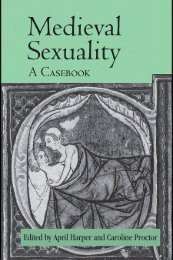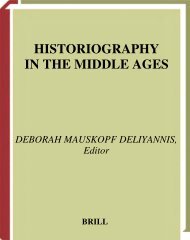FESTIVE SATIRE: JULIAN'S MISOPOGON AND THE NEW YEAR AT ANTIOCH* By MAUD W. GLEASONOne morning early in <strong>the</strong> year 363, <strong>the</strong> citizens of Antioch awoke to find, prominentlydisplayed outside <strong>the</strong> imperial palace, a lengthy <strong>and</strong> vehement communication from <strong>the</strong>iremperor. He begins with an attack on his own beard, <strong>and</strong> we know <strong>the</strong> satire today as <strong>the</strong>,Visopogon, or 'Beard-Hater'. But it also bore <strong>the</strong> title 'Oration on Antioch' (Antiochikos).The double title is indicative of a parodox in its rhetorical strategy. Normally anAntiochikos would be a panegyric,' <strong>and</strong> normally a rhetorical description of an emperor'sperson <strong>and</strong> achievements should conform to <strong>the</strong> encomiastic formulae of <strong>the</strong> basilikosBut julian in his satire turns <strong>the</strong> panegyrical topoi upside down, <strong>and</strong> abuses <strong>the</strong> city byjoining its citizens in abuse of himself.3 In so doing he paints a vivid contrast between <strong>the</strong>emperor, breast shaggy like a lion, beard alive with vermin, fingers stained with ink, <strong>and</strong><strong>the</strong> smooth-skinned Phaeacians of Antioch. Scholars have been embarrassed at <strong>the</strong>spectacle. Was <strong>Julian</strong> sufficiently conscious of <strong>the</strong> dignity of his position?The social context of this document has not been thoroughly examined, although itscontent has never ceased to amaze. Glanville Downey called it 'one of <strong>the</strong> most incrediblethings that a Roman emperor, supposed to be in his right senses, ever did'.+ But for manyhistorians, to claim that a work is sui genefis is to admit defeat: thus four pages afterpronouncing <strong>the</strong> <strong>Misopogon</strong> incredible, Downey concludes that '<strong>the</strong> satire was a reasoned(if unsuccessful) device, a planned <strong>and</strong> considered effort of propag<strong>and</strong>a'. O<strong>the</strong>r scholarsregard <strong>the</strong> ,Visopogon as a far from rational production, <strong>and</strong> seek its origins deep in <strong><strong>Julian</strong>'s</strong>unconscious mind. Festugikre felt that <strong>the</strong> immediate circumstances of <strong>the</strong> satire did notsuffice to explain it. He looked beyond to 'distant causes'; '<strong>Julian</strong>, as we know, had a harsh<strong>and</strong> unhappy childhood'.s Robert Browning would have it both ways: 'It is anextraordinary exercise in public relations <strong>and</strong> a revelation of <strong>the</strong> complexity of <strong><strong>Julian</strong>'s</strong>mind'.6 Since by definition <strong>the</strong> public only underst<strong>and</strong>s ordinary public relations, <strong>and</strong>revealed complexities remain complex, Browning's premises entail his conclusion: 'The,Wisopogon must have been an enigma to those who took <strong>the</strong> time to read it'.It is lezitimate " to ask whe<strong>the</strong>r anv im~erial document can be so unusual that wecannot assimilate its composition <strong>and</strong> p&lica;ion into existing patterns of social behaviour.We learn very little when we dismiss <strong>the</strong> <strong>Misopogon</strong> as an isolated aberration of anindividual psyche. Of course <strong>the</strong> emperor had a psyche. But <strong>the</strong> emperor's psyche was notwhat his subjects saw. To his subjects, it has been argued, '<strong>the</strong> emperor was what <strong>the</strong>emperor did'.7 This approach can supply a helpful corrective to our study of <strong>Julian</strong> if itprompts us to consider what 11: wrote more as a part of 'what he did' than as evidence forwhat he felt. The composition <strong>and</strong> prominent display of <strong>the</strong> <strong>Misopogon</strong> constituted a formof public communication-a fact easy to lose sight of when we fall into talking about<strong><strong>Julian</strong>'s</strong> treatises as if <strong>the</strong>y were emotional purgatives. It is sobering to remember that onlyby chance do we learn from Malalas that this satire was posted up on <strong>the</strong> Tetrapylon of <strong>the</strong>Elephants for all to see.8 Without this indication of its publication we might indeed be* An earlier versio~l of this paper was presented at 4 'Julia11 <strong>the</strong> Apostate at Antioch', Church History 8Stanford U~liversity, whose hospitable classicists <strong>and</strong> ('93912 3'0.impeccable librarians provided an ideal environment in5 A. J. Festugikre, Antioch paienne et chritiennewhich to work. I should like to thank Peter Brown, (1959)) 63-4. Festugikre's approach may seem exag-David Potter, John J. M'i~lkler, Ronald Stroud, gerated, but <strong>the</strong> trend conti~lues. A recent bookChristopher Farao~le <strong>and</strong> Scott Bradbury for <strong>the</strong>ir help compares <strong><strong>Julian</strong>'s</strong> behaviour with that of a wronged<strong>and</strong> comments on various drafts. And I hope that child: Polymnia Atha~lassiadi-Fowden, <strong>Julian</strong> <strong>and</strong>Geoffrey de Ste. Croix will receive this effort as a ffellenism: an Intellectual Biography (198 I), 201-2.grateful response to <strong>the</strong> stimulus of his undergraduateteaching.The <strong>Emperor</strong> <strong>Julian</strong> (1976), 158.7 F. G., B. Millar, The Ernperor in <strong>the</strong> Itoman Worldr Such as <strong>the</strong> Antiochikos of Libanius, Or. XI. ('977)tSee Mena~lder Rhetor's paradigm for a Basilikos8 Chron. 328. 3-4. Even <strong>the</strong> illiterate should not beLogos: D. A. Russell <strong>and</strong> N. G. Wilso11, ~Vfen<strong>and</strong>er excluded as a potential audience, since <strong>the</strong> literate oftenRhetor (1981), 76-94.read out loud. For fur<strong>the</strong>r discussio~l of publicly posted3 IIe is so co~lfide~lt of his own worth that criticism of satire see below.himself in <strong>the</strong>ir terms amounts ultimately to an indictmentof <strong>the</strong>m.
tempted to ab<strong>and</strong>on all quests for <strong>the</strong> social context of <strong>the</strong> <strong>Misopogon</strong> <strong>and</strong> to regard it as apsychiatric or rhetorical exercise.Did contemporaries think <strong>the</strong> <strong>Misopogon</strong> odd? Ammianus thought its criticismsharsher than <strong>the</strong> situation warranted,', but did not castigate <strong>the</strong> emperor for doing anythingundignified-as he did not hesitate to do on o<strong>the</strong>r occasion^.^^ After <strong><strong>Julian</strong>'s</strong> deathLibanius praised him for resorting not to <strong>the</strong> punishments of <strong>the</strong> despot but to those of <strong>the</strong>orator.Ir In his correspondence with <strong>the</strong> emperor, Libanius never mentions <strong>the</strong> hlisopogonexplicitly, although in his sixteenth oration he tries to refute its arguments point bypoint.lZ We are not entitled to conclude, however, that Libanius passes over <strong>the</strong> incidentin silence because he felt it embarrassed <strong>Julian</strong> ra<strong>the</strong>r than Antioch. Zosimus transmits <strong>the</strong>opinion (undoubtedly from Eunapius) that it was a most elegant speech (A6yov&~TEIOT~TOV).'~ Socrates <strong>and</strong> Sozomen both report favourable judgements on <strong>the</strong><strong>Misopogon</strong>. As ecclesiastical apologists <strong>the</strong>y knew how to appreciate invective. The formerclaims that <strong>the</strong> satire left 'an indelible stigma on <strong>the</strong> city <strong>and</strong> its inhabit ants'.^+ The lattercomments, 'he suppressed his feelings of indignation <strong>and</strong> repaid <strong>the</strong>ir ridicule by wordsalone; he composed <strong>and</strong> sent to <strong>the</strong>m a most excellent <strong>and</strong> elegant work under <strong>the</strong> title ofBeard hater'.^^ Nei<strong>the</strong>r of <strong>the</strong>se historians makes a practice of sparing <strong>Julian</strong>. Ifcontemporary Antiochenes of any stripe felt (as modern readers do) that in publishing <strong>the</strong><strong>Misopogon</strong> <strong>the</strong> emperor had committed a notorious faux pas, why did <strong><strong>Julian</strong>'s</strong> Christianenemies not even allude to that fact? Gregory of Nazianzus knew <strong>the</strong> :Wisopogon <strong>and</strong> wrotean uninhibited attack on <strong>Julian</strong> soon after he died. But <strong>the</strong> most he can claim is that <strong>the</strong><strong>Misopogon</strong> is nozu an object of ridicule, conceding that this was not so during <strong><strong>Julian</strong>'s</strong> 1ife.1~So <strong>the</strong> hlisopogon seems not to have shocked <strong><strong>Julian</strong>'s</strong> contemporaries as it shocks us.The purpose of this paper is to investigate why it did not, by seeking to define a range of'normal' or traditional behaviour within which <strong>the</strong> actions of both <strong>Julian</strong> <strong>and</strong> <strong>the</strong>Antiochenes can comfortably be contained.It is clear from <strong>the</strong> LVisopogon itself that <strong>the</strong> emperor is replying in prose to scurrilousjibes in verse that have been circulating about him in <strong>the</strong> city (338'4, D; 345D et passim).Things had not been going well between <strong>Julian</strong> <strong>and</strong> Antioch,~': but <strong>the</strong>re must have been alast straw that provoked <strong>the</strong> <strong>Misopogon</strong>. Libanius provides a clue. After <strong>Julian</strong> left <strong>the</strong> cityon 5 March, threatening never to return, Libanius wrote an oration in which he haranguedhis fellow-citizens about what went wrong. He imagines <strong>the</strong>m making excuses for <strong>the</strong> widespreadcirculation of lampoons that exasperated <strong>the</strong> emperor. 'People will say, "We wereafraid that we would be held responsible for abolishing <strong>the</strong> holiday if we forbade what wassanctioned by religious cu~tom.""~ There was a holiday, occurring shortly before <strong>the</strong>9 'probra civitatis i~lfe~lsa mente dinumerans, 'Here is a pillar for you from me, higher <strong>and</strong> more adde~lsque veritati complura' (XXII. 14. z).visible than <strong>the</strong> Pillars of IIeracles .. . which will e.g. XII. 7. 3 (Julia11 jumps up i11 <strong>the</strong> senate to greet inevitably become known everywhere by everyone as it Maximus); XXII. 14. 3 (Julia11 carries sacred emblems in moves about . . . pillorying you <strong>and</strong> your deeds', op. place of <strong>the</strong> priests).cit., ch. 42. See n. 92 below.'7 <strong><strong>Julian</strong>'s</strong> religious <strong>and</strong> eco~lomic policies were <strong>the</strong>l2 He alludes to it indirectly i11 a private letter to major points of frictio11. For a discussion of <strong>the</strong> latter<strong>Julian</strong> (802. z), referring to <strong>the</strong> city's xaxo~pcryia'by see G. Downey, op. cit. (11. 4 above), <strong>and</strong> 'Thewhich I mean not <strong>the</strong> scarcity of foodstuffs, but <strong>the</strong> fact Economic Crisis at Antioch under Julia11 <strong>the</strong> Apostate',that it has been judged wicked, evil, <strong>and</strong> ungracious in P. R. Coleman-Norton, ed., Stzidies in Roman Eco-(6~1TTOV~PUxai KUK~ xai Crxapw~os K~KPIT~I)'. Here nonzic <strong>and</strong> Social Histow in Honor of A. C. Johnson&xapia~o~ recalls €is &xaplcr~aKUT&~LIEVOS fib T ~ S (1951)? 312-21, <strong>and</strong> P. Petit, Libanius et la viexap1-r~~i11 <strong>the</strong> peroration of <strong>the</strong> A14isopogon (371B). munzczpale a Antioch au A' sigcle aprgs J.-C. (1955)~ .-.'3 Histon'a Nowz 111. I I. 109-18.'4 Socr., HE III. 17. Although Socrates was able to Lx Or. XVI. 35. Compare <strong>Misopogon</strong> 355C, wherequote from <strong><strong>Julian</strong>'s</strong> htter to <strong>the</strong> Alex<strong>and</strong>rians (111. 3), Julia11 like Libanius puts words illto <strong>the</strong> citizens'we cannot be certain that he had access to <strong>the</strong> rest of mouths: 'And yet you [Julia111 think that even <strong>the</strong><strong><strong>Julian</strong>'s</strong> works. IIe does, however, give details of <strong>the</strong> charming youths i11 <strong>the</strong> city ought to keep quiet <strong>and</strong>, iflampoons against Julia11, which probably were not to be possible, think what pleases you, but at least say what isfound i11 Eu~lapius' eulogistic account.agreeable for you to hear! But it is <strong>the</strong>ir independence15 Soz., HE v. 19. Sozomen records <strong>the</strong> contents of that makes <strong>the</strong>m hold revelli~lg processions (KOLI~~EIV~,three more of Julia~l's public letters <strong>and</strong> quotes a fourth which <strong>the</strong>y're ge~lerally doing all <strong>the</strong> time, but duringin its entirety (v. 16).<strong>the</strong> festivals <strong>the</strong>y're doing more than usual'. Compare16 '. .. though at <strong>the</strong> time your imperial rank made it also <strong>the</strong> scurrilous young men in Ammianus' excursusimportant' (Cbntra Jzilianum 11. 41, PG 35. 717). The on lawyers who spend <strong>the</strong>ir time composing nzziniambiconclusio~l of this piece shows that Gregory thought of <strong>and</strong> insulting <strong>the</strong>ir betters (xxx. 4. 14-17).himself as posting metaphorically a counter-~<strong>Misopogon</strong>.













